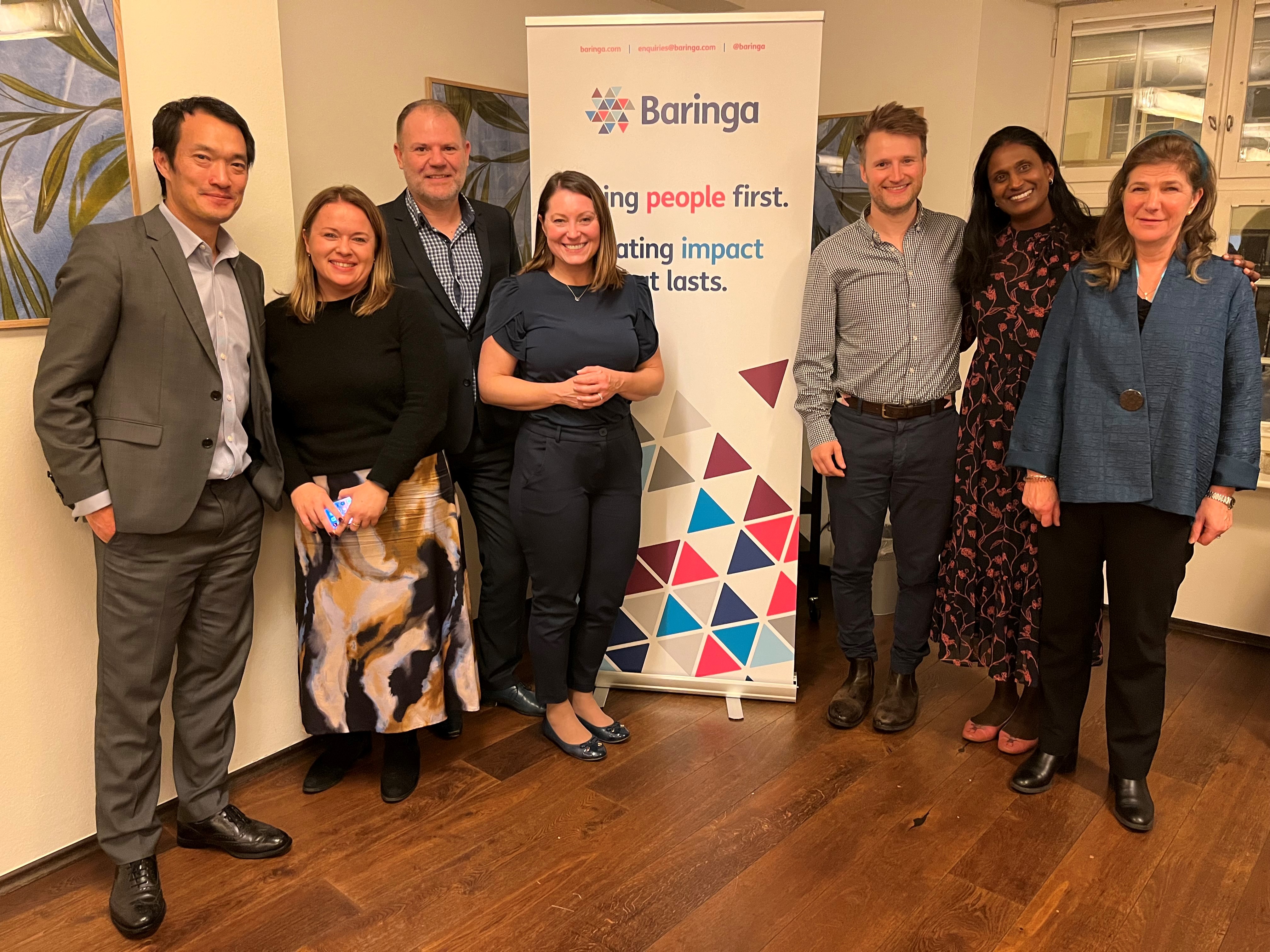
Optimising data and AI for pharmaceutical and life sciences success
6 min read 13 January 2025
The ever-growing evolution of artificial intelligence (AI) - especially generative AI - and the expansion of digital capabilities increasingly herald new opportunities to streamline and enhance healthcare, from basic science to patient care. Its ability to harness and analyse large amounts of complex data can aid drug discovery, optimise clinical trial protocols, generate publications and inform treatment pathways. It is driving manufacturing automation, enhancing communication and supporting wider business functions.
However, such opportunities are not without potential pitfalls. At our recent Baringa Connect event, we brought together a panel of experts to discuss three key areas:
- ensuring data quality through a data-first approach,
- the need for a mindset shift to take full advantage of the opportunities that data and AI can afford us, and
- highlighting value and securing corporate buy-in for AI initiatives.
Our Healthcare and Life Sciences Transformation Partner, Laveshni Reddy, and Baringa Partner in Data, Analytics and AI, Michael Lee, spoke alongside Sidhyansh Saxena, Head of BD Europe for Ginkgo Bioworks, and Adriana Castro, Global VP for Digital Transformation at The Adecco Group. Here are the most important insights gathered from this impactful discussion.
Optimising data and AI for pharmaceutical and life sciences success
Ensure data quality through a data-first approach
In this increasingly digital and analytical world, corporate success often hinges on effective data management. The panel discussed the importance of data control and the need for organisations to transition to a data-first approach to enable a smoother flow of information between teams.
Data is only as good as its contextualisation; for those without a data-first set-up, this can often be lacking, making it harder to identify connections across datasets. AI can allow for more interoperability by extracting data from natural language or PDFs and can make new connections among disparate datasets that humans cannot typically achieve.
Recommendation: Consider data as a product you make available company-wide. Do not underestimate the number of people needed to keep data organised and controlled, and protect and ensure high quality standards. Organisations must be dedicated to data management and your set-up should reflect this commitment.
Adapt your mindset and culture
To facilitate a data-first culture, companies must change their mindsets, a shift that will likely take several years. Leading the charge is the Chief Information Officer (CIO), a role that has gained increasing prominence over the years and should continue to do so. Their expertise is fundamental to driving forward this change.
Additionally, teams responsible for AI must sit within the business function in need of transformation, but should also be encouraged to be fluid; moving around and sitting within different teams as required. All teams will increasingly need some form of data-centred skills and knowledge of AI to manage projects and ensure the shift to a data-first culture is, and remains, successful.
Recommendation: Bring data scientist teams closer to the business and invest in diversifying employee skills and capabilities. Learning and Development (L&D) teams must adapt accordingly.
Make the value case and secure buy-in
Data should be used and reused like an asset, feeding into and driving business outcomes. To help facilitate this, companies should create key value cases that can be used across several business functions. These should highlight different scenarios, pinpoint target stakeholders and data users, such as the payer, the buyer and the user, and clearly show the desired business objective and outcome.
Unfortunately, many initiatives quietly fade away because few people know about them. Having buy-in from the company's C-Suite and senior management is key to ensuring projects receive the limelight they need to thrive, generate success and inspire others.
Recommendation: Successful AI or data initiatives require patience, finance and necessity/intention. Ensure all three factors are considered from the beginning and communicated appropriately. All projects should be sponsored by the CXO to ensure opportunities to showcase progress and success, and develop the value case for the benefit of other teams.
The challenges of data and AI
The potential for AI to transform the pharmaceutical and life sciences sector is very real. However, as useful as AI can be in today’s world, it is still learning and therefore, susceptible to mistakes.
Misinformation is a major challenge, particularly for the life sciences sector. More healthcare-focused publications are available compared with 10 or 20 years ago[1] and alongside this, we are seeing an increase in the use of AI to generate medical content[2]. AI undoubtedly has its uses in medical content generation, such as statistical analyses or literature reviews, but its inability to distinguish fact from fiction has led to concerns that without proper management or regulation, it could result in low-quality or false content. This subsequently impacts the reputation of the entire scientific community and undermines public trust. More importantly, it makes it harder for patients and their families to find accurate, reliable information, which could lead to ill-informed decisions, including avoiding treatment and care altogether.
An important component of successful AI utilisation will be in recognising when it can be useful and when the human touch still wins. In recruitment, for example, AI models still cannot consistently replicate the choices people make in hiring decisions. There remains a risk of bias during the recruitment process and questions around ethical and legal standards[3]. It is therefore crucial that human oversight and involvement remain.
Ensuring data and AI success
With data and AI increasingly becoming a core part of an organisation’s cultural ecosystem, there is a growing need for collective responsibility to oversee, manage and control such digital innovations. All employees have a duty to understand how to harness this technology effectively, and senior management must be fully supportive for AI initiatives to succeed.
When considering the impact of your organisation’s data strategy, and how to ensure data and AI initiatives will be successful, we recommend you think about the following:
- Data systems. Treat the data like a product and invest time and effort in getting the data and data systems right. No one will do this for you.
- Adoption. Embrace the need for a mindset shift when working with data and AI, and consider how initiatives will be adopted by the organisation. This should begin at the start of the project journey and continue throughout. Adoption and culture shift will never be successful if this thinking only occurs during the last mile.
- Automation. As data and AI capabilities develop, a growing number of tasks, processes and even jobs are becoming automated. There is huge scope for automation to enhance productivity and impact, and this helps support the value case.
The future of data and AI
Cutting-edge digital technologies like AI have the potential to disrupt healthcare for the better, but we must all be active participants in its development, growth and implementation. Embracing data as a strategic asset and getting the right systems in place, embedding a data-first mindset within your company’s culture, and ensuring buy-in from senior leaders are critical to unlocking their full capabilities. Robust oversight and an ethical approach to AI implementation can help overcome current challenges, such as misinformation and bias, to ensure streamlined operations, faster drug discovery, and improved patient outcomes.
If you work in the life sciences sector and would like support to unlock the potential of data, analytics and AI within your organisation, please contact Laveshni Reddy and Michael Lee.

[1] Mendlovic, J., Mimouni, F. B., Arad, I., & Heiman, E. (2022). Trends in Health Quality-Related Publications Over the Past Three Decades: Systematic Review. Interactive journal of medical research, 11(2), e31055. https://doi.org/10.2196/31055
[2] Davide Ramoni, Cosimo Sgura, Luca Liberale, Fabrizio Montecucco, John P.A. Ioannidis, Federico Carbone (2024). Artificial intelligence in scientific medical writing: Legitimate and deceptive uses and ethical concerns. European Journal of Internal Medicine, Volume 127, Pages 31-35, ISSN 0953-6205, https://doi.org/10.1016/j.ejim.2024.07.012
[3] Albassam, W. A. (2023). The Power of Artificial Intelligence in Recruitment: An Analytical Review of Current AI-Based Recruitment Strategies. International Journal of Professional Business Review, 8(6), e02089. https://doi.org/10.26668/businessreview/2023.v8i6.2089
Our Experts


Related Insights

Organisational agility: a guide to taking the first steps
Our business agility and operational excellence expert Simon Tarbett offers some advice to clients when asked the question, Where To Start?
Read more
The need for agility to grow revenue and thrive in a turbulent market
We’re looking at how organisations need to be agile if they’re to grow revenue and thrive in a turbulent market.
Read more
How to set targets to drive business performance
Targets are essential for driving better business results. Let’s discuss what companies should – and shouldn’t – be doing.
Read more
How frozen organisations can become fluid
To develop organisational agility, focus on being like water.
Read moreIs digital and AI delivering what your business needs?
Digital and AI can solve your toughest challenges and elevate your business performance. But success isn’t always straightforward. Where can you unlock opportunity? And what does it take to set the foundation for lasting success?